- Home
- Linda Howard
Sarah's Child
Sarah's Child Read online
LINDA HOWARD
Sarah’s Child
CONTENTS
CHAPTER ONE
CHAPTER TWO
CHAPTER THREE
CHAPTER FOUR
CHAPTER FIVE
CHAPTER SIX
CHAPTER SEVEN
CHAPTER EIGHT
CHAPTER NINE
CHAPTER TEN
CHAPTER ELEVEN
CHAPTER TWELVE
COMING NEXT MONTH
CHAPTER ONE
It was the end of a long week, and Sarah knew that she should go home, but just the thought of facing the broiling late August heat was enough to keep her sitting in her chair with the air-conditioning humming pleasantly overhead. She wasn’t working; she’d swiveled the chair around and spent the last fifteen minutes simply staring out the window, too relaxed to really care that it was getting late. The sun had dipped low enough that the Dallas array of dazzling skyscrapers of glass and steel was outlined against a bronzed sky, which meant she’d missed the six o’clock news yet again. It was Friday evening; her boss, Mr. Graham, had left over an hour before. There was no reason why she shouldn’t join the mass exodus on the streets below, yet she felt reluctant to go home. She’d taken such pains with her condominium; made it as homey and comfortable as she could, but lately the emptiness of it had been haunting her. She could fill it with music, rent any movie and watch it on the VCR, lose herself in reading and pretend that she was in any other country in the world, yet she would still be alone. Lately it was becoming a state of loneliness, rather than one of solitude.
Perhaps it was the weather, she thought tiredly. The summer had been hot and humid, wearing everyone down, but she knew inside that it wasn’t the heat that was bothering her. It was the inevitable sensation of time slipping away, as summer died once more and became another autumn. It seemed that even in the fierce heat she could feel the chill of winter in her bones. It was more than the passing of another season: it was her own youth slipping away, inexorably draining from her grasp. The years had passed, and she’d devoted herself to her work, because there was nothing else, and now she realized that all the things she’d wanted had passed her by. She hadn’t wanted riches, or material things. She’d wanted love, a husband and children, a home filled with laughter and security, the things she’d never had as a child. She’d stopped even dreaming about them, she realized, and that was the saddest thing of all. But then she’d never really had a chance: she’d fallen in love with the one man she couldn’t have, and it appeared that she was one of those women who loved only once in their lifetime.
Her phone gave a muted ring, and a slight frown of puzzlement touched her brow as she reached for the receiver. Who would be calling the office at this hour?
“Sarah Harper,” she said briskly.
“Sarah, this is Rome,” a deep voice said by way of identification.
Her heart gave a jump and hung in her throat. She didn’t need to hear his name to know who was on the other end of the line. She knew his voice as well as she knew her own, and the clipped accent that hadn’t softened despite years in the south would always give him away. But she swallowed the lump, straightened her spine, and pretended this was just another business call. “Yes, Mr. Matthews?”
He made an impatient sound. “Damn it, don’t call me that! It’s all right in the office, but this…this isn’t business.”
Sarah swallowed again, but she couldn’t say anything. Had she conjured him up? Had thinking about him produced this call? After all, it had been months since he’d said anything to her other than a polite “good morning” whenever he came into the office to talk to Mr. Graham.
“Sarah?” He was really impatient now, and his rising ire was revealed in the way he barked her name.
“Yes. I’m still here,” she managed.
“I’m selling the house,” he said abruptly. “I’m boxing up Diane’s things…and the boys’…. I’m going to give them all to the Salvation Army. But I found a box of things that Diane had kept from high school, stuff that the two of you did together, pictures, and I thought you’d like to go through it. If you want any of it, you can have it. If not….”
He didn’t finish the sentence, but she knew. If not, then he’d burn it. He’d take all of those memories and destroy them. She winced inside at the thought of going through the box and reliving the years she’d grown up with Diane, because the loss still hurt, but neither could she let him burn Diane’s mementos. Perhaps she couldn’t go through the box yet, but she’d keep it, and in later years she’d be able to take the things out and remember without too much pain, with only sadness and nostalgia.
“Yes,” she said hoarsely, forcing the word out. “Yes, I want it.”
“I’m about to leave now, to go to the house and finish packing. You can get the box anytime tonight.”
“I’ll be there. Thank you,” she whispered, and he hung up, leaving her with the phone still pressed to her ear and the dial tone buzzing.
Her hand was shaking as she replaced the receiver, and suddenly she noticed that she was no longer sitting. At some point during the conversation, tension had propelled her to her feet. Quickly she leaned down to get her purse from the lower drawer of the desk, then locked the desk and turned out the lights, locking the door behind her as she left.
It wasn’t only her hand that was shaking; her entire body was quivering. Talking with Rome always did that to her. Even after years of training herself not to think about him, of not allowing herself to even dream about him, just hearing his voice had the power to reduce her to jelly. Working for the same company was bad enough; she’d even transferred to a different department so she wouldn’t see him as often, but that had eventually backfired on her: He’d been promoted steadily through the ranks and was now one of the corporate vice presidents. Her position as secretary to the senior vice president threw her constantly into contact with him; the only salvation she’d had was that his attitude toward her was strictly business, and she’d forced herself to treat him in the same manner. What else could she do, when she’d been foolish enough to fall in love with her best friend’s husband?
Even though the shadowed multilevel parking deck was at least ten degrees cooler than the street, the heat still slapped her in the face as she walked quickly to her car, a late model, low-slung Datsun 280-ZX. The car was, she feared, an example of her growing tendency to collect things to replace the emptiness at home. All her life she’d sworn to avoid the cold hollowness of her parents’ home, yet as she grew older she tried harder and harder to fill the empty places with things. The car was gorgeous, and it got her where she was going faster than she needed to be there; she enjoyed driving it, she liked it, but she hadn’t needed it. The car she’d traded in had been a good car, and it hadn’t been that old.
Rather than drive straight to the house where Rome and Diane had lived, in one of the posher Dallas neighborhoods, Sarah deliberately drove to a restaurant and wiled away an hour and a half, picking at her seafood while all of her instincts screamed at her to hurry, to see Rome as soon as she could. But some part of her was reluctant to enter the house where he’d lived with Diane, where she and Diane had laughed and played with the babies. She hadn’t been inside it in two years…it had been almost two years since the accident.
When her watch told her it was eight o’clock, she paid her tab and drove slowly, carefully, to the house. Her heart was pounding again, and she felt a little sick to her stomach. Her palms were damp; she clutched the steering wheel more securely to make certain it didn’t slip in her grip.
How did she look? She hadn’t checked her appearance. Her lipstick had worn off surely, but she didn’t bother to replace it. With one hand she felt to see if any strands of hair had escaped from the severe
twist she wore while working, but it still felt reasonably tidy, so she sighed and forgot about it.
Rome’s dark blue Mercedes was in the driveway, so she parked behind it and got out, walking slowly up the sidewalk to mount the five shallow steps and press her finger to the doorbell. The grass had been kept mowed, she noticed, and the shrubbery was trimmed. The house didn’t look empty, but it was. Heartbreakingly empty.
After a moment, Rome opened the door and stepped aside to let her enter. After a brief glance at him, Sarah felt as if she’d been punched in the stomach. She hadn’t expected him to be wearing a three-piece business suit, but somehow she’d forgotten how powerfully he was built, how impossibly virile he looked in tight jeans. He wore track shoes, no socks, an old pair of jeans, and a white T-shirt that clung to his muscled torso, and he looked absolutely beautiful to her.
He glanced down at her, taking in the trim business suit she still wore. “You haven’t been home yet?” he asked.
“No. I stopped to eat dinner, but I haven’t gone home.” It was uncomfortably warm in the house; he’d opened some windows but hadn’t turned on the central air-conditioning. She pulled off her light linen jacket and started to hang it in the closet as she’d always done when visiting Diane, then caught herself and instead simply tossed it over the stairway railing. As he led the way upstairs she loosened the collar of her white tailored silk blouse and rolled the sleeves up to her elbows.
Rome paused before the doorway to the bedroom he’d shared with Diane, and his dark eyes were shadowed, his mouth grim, as he looked at the closed door. “It’s in there,” he said briefly. “In the closet. I’ll be in the boys’ bedroom packing their things. Take your time looking through the stuff.”
Sarah waited until he’d gone into the other bedroom before she slowly opened the door and entered Diane’s bedroom, turning on the light and standing for a moment looking around. Everything had been left as it had been the day of the accident. The book she’d been reading was still lying on the bedside table. Her nightgown was tossed across the foot of the bed. Rome hadn’t spent a night here since Diane had died.
Sarah pulled the box out of the closet and sat down on the floor to go through the contents, tears blurring her vision as she picked up the first photograph of her and Diane together. God, if it hurt her this much to lose a friend, how did Rome feel? He’d lost his wife and two sons.
She and Diane had always been best friends, all the way through school. Diane had been a human dynamo, laughing and chattering, propelling the quieter Sarah along the way. Her blue eyes had sparkled, her honey-brown curls had bounced, and she’d infected everyone who came into contact with her with the enthusiasm for life that brightened every day for her. Oh, the plans she’d made! She was never going to marry. She was going to be a famous fashion designer and travel all over the world. Sarah’s dreams had been only of a real family, one with love in it. Somewhere along the way their plans had been switched. Diane had fallen in love with a tall dark-eyed young rising executive who worked for the same company where Sarah had gotten a job, and from that moment on Sarah had known that her dream would never come true. Diane considered a glamorous career as a fashion designer well lost when she could have Rome Matthews, when she could give birth to his two adoring and adorable sons and bask in his love. Sarah quietly devoted herself to the job that was her only solace.
She’d tried not to love Rome, but she’d discovered that emotions weren’t easily controlled. If she hadn’t loved him before he met Diane, she might have kept her feelings from growing into anything serious, but she’d been his from the first. From the moment she’d met him, she’d known, deep inside that he would be more to her than just a colleague. It was his eyes, she thought; they were so deep and dark, eyes with a burning inner intensity. Roman Caldwell Matthews was no lightweight. He had drive and ambition, coupled with a lightning intelligence that had carried him through the ranks of middle management like a meteor. Oh, he wasn’t handsome: his face had a rough-hewn, slightly battered look to it; his cheekbones were too high and sharp; his blade of a nose had been broken once; and his jaw was as solid as a piece of granite. He was a man who would reach out and grasp life, and shape it the way he wanted. He’d been friendly enough to her, but Sarah knew she was too pale and quiet to interest a man with his forceful personality.
Still, the summer when she’d invited Diane to the company picnic she hadn’t expected him to take one look at Diane’s vibrant beauty and claim her for his own. But it had happened, and Diane and Rome had married five months later. Three months after their first anniversary Justin had been born, and two years later Shane. Two beautiful little boys, with their mother’s looks and their father’s determination, and Sarah had loved them because they were Rome’s children.
She’d remained as close to Diane as before, but she’d always been careful not to infringe on the time Rome spent with his family. He traveled a great deal, and Sarah limited her visits to the days he was out of town. She couldn’t say just why, but she sensed that Rome disapproved of her close friendship with Diane, though to her knowledge he’d never said anything. Perhaps it was that he simply didn’t like her, though she’d never done anything to earn it. She’d tried to stay out of his way, and she’d never, never told Diane anything about how she felt. There was no point in it; it would only have distressed Diane, and hurt their friendship.
Sarah had dated, and still did, but only casually. It wouldn’t have been fair to some other man to encourage a closer relationship when there was no way she’d be able to return any love offered to her. Everyone who asked, teasingly, when she was going to marry, had received the same reply: She loved her work too much to wash dirty socks for some man. It had been a lighthearted, stock answer, and it had served the purpose of protecting her vulnerable heart, but it had been a lie. She’d never wanted a career, but it was all she had left, so she’d given it her best. The charade had fooled everyone but herself.
Rome had been devoted to Diane and the boys. The freeway accident, almost two years before, had almost destroyed him. It had destroyed the laughter in him, the fierce-burning fire in his eyes. Diane had been driving the boys to school, and a drunk weaving his way home in the early-morning traffic had crossed out of his lane and hit them head-on. If he hadn’t been killed immediately, Sarah felt that Rome would have choked the man with his bare hands, he’d been so insane with grief when he’d been told. Justin had been killed on impact; Shane had died two days later. Two weeks after the accident Diane had died without ever regaining consciousness or knowing that her sons were gone. During those two weeks, Sarah had spent as much time as she could at her friend’s bedside, holding the limp hand and trying to will her to live, but fearing that Diane wouldn’t want to wake up from her death sleep. Rome had been a permanent fixture on the other side of the bed, holding the hand that bore his ring, his face gray and drawn, locked inside himself. Diane had been his only hope, his only remaining bit of sunshine, and her frail light had flickered and gone out, leaving him in darkness.
Gently Sarah went through all of the snapshots, seeing herself and Diane in various stages of their childhood and adolescence, mixed in with photographs of the boys as babies, toddlers, and rowdy little boys. Rome was in some of those pictures, romping with the boys, washing the car, mowing the grass, doing all of the normal things that fathers and husbands do. Sarah lingered over a picture of him lying on his back in the grass, wearing only a brief pair of denim shorts, holding Justin dangling over his head. His strong brown arms were steady as he held the toddler up, and it was evident that the child felt secure in his father’s hands. Justin had been shrieking with laughter. On the grass beside them, Shane had been trying to climb to his baby feet, and one tiny plump hand had clutched the hair on Rome’s chest in an effort to pull himself up.
“See anything you want?”
The question startled her, and she jumped, dropping the picture back into the box. She realized that he was asking in general and hadn’t
noticed her staring at his picture with sick longing, but her shadowy green eyes were wide and wary as she scrambled to her feet, smoothing her skirt.
“Yes. I’ll take the box. There are a lot of pictures in here of Diane and the boys…if you don’t—”
“Take them,” he said curtly, walking into the room. He stopped in the middle of the floor and stood looking around, as if he’d never been there before, but his eyes were bleak, and his mouth looked as if it would never smile again. He did sometimes smile, Sarah realized, after a fashion, but it was merely a polite movement of his lips rather than an expression of humor. Certainly the smile never reached his eyes and lit the dark fires that had once smoldered there.
He jammed his hands into his pockets, as if he had to do something to keep them from knotting into fists. His shoulders were tense, braced against the impact of memories that this room must bring to him. He’d slept in that bed with Diane, made love to her, wrestled with the boys on early Saturday mornings when they came running in to wake him up. Quickly Sarah leaned down to pick up the box, turning her gaze away from him to keep from witnessing his anguish.
The anguish was as much in her as it was in him. She loved him enough to wish Diane back for him, so he could smile again. He would always be Diane’s anyway, because her death hadn’t stopped his love for her. He was still grieving for her, still hurting from her loss.
“I’m finished in the boys’ room,” he said remotely. “Everything’s packed up. I…I—” Suddenly his voice broke, and Sarah’s heart broke with it. He drew a ragged breath, his chest heaving with the effort it took to control himself.
Suddenly his face twisted with rage, and he whirled to slam his fist against the dresser, rattling the bottles of perfume and cosmetics that still littered the top. “Dammit, it was such a waste!” He cursed violently, then groped for the dresser as his body sagged under the weight of his anger and grief. He’d never known defeat until his family had been taken from him. Death was final, permanent, striking without warning and destroying the life he’d built for himself.

 Mr. Perfect
Mr. Perfect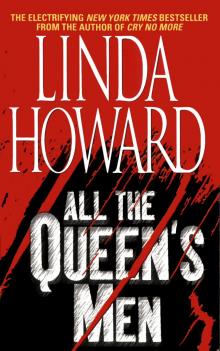 All the Queen's Men
All the Queen's Men Midnight Rainbow
Midnight Rainbow Diamond Bay
Diamond Bay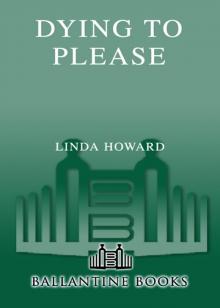 Dying to Please
Dying to Please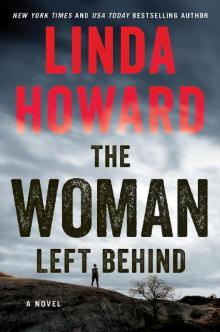 The Woman Left Behind
The Woman Left Behind Come Lie With Me
Come Lie With Me Drop Dead Gorgeous
Drop Dead Gorgeous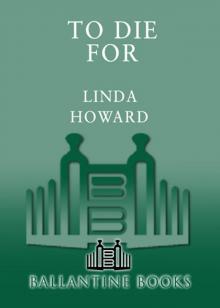 To Die For
To Die For Ice
Ice Overload
Overload Shadow Woman
Shadow Woman Veil of Night
Veil of Night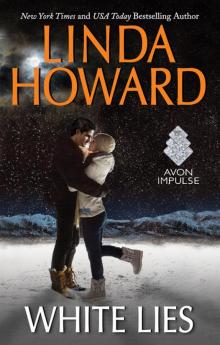 White Lies
White Lies Son of the Morning
Son of the Morning The Complete Mackenzies Collection
The Complete Mackenzies Collection Lake of Dreams
Lake of Dreams DeathAngel
DeathAngel Loving Evangeline
Loving Evangeline Burn
Burn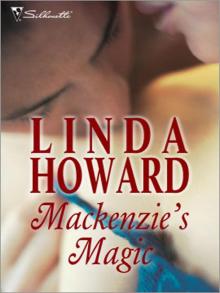 Mackenzie's Magic
Mackenzie's Magic Against the Rules
Against the Rules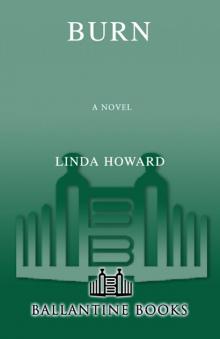 Burn: A Novel
Burn: A Novel A Lady of the West
A Lady of the West Almost Forever
Almost Forever Open Season
Open Season Now You See Her
Now You See Her Prey
Prey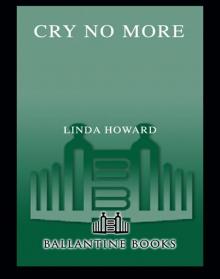 Cry No More
Cry No More Sarah's Child
Sarah's Child Angel Creek
Angel Creek Death Angel
Death Angel Kill and Tell
Kill and Tell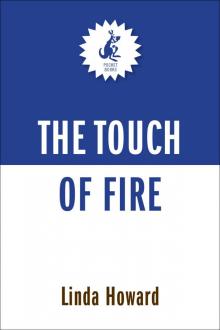 The Touch of Fire
The Touch of Fire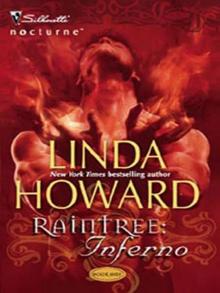 Raintree: Inferno
Raintree: Inferno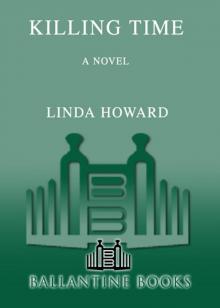 Killing Time
Killing Time Cover of Night
Cover of Night Tears of the Renegade
Tears of the Renegade Heartbreaker
Heartbreaker The Cutting Edge
The Cutting Edge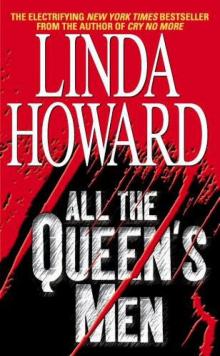 All The Queen's Men cs-2
All The Queen's Men cs-2 Veil of Night: A Novel
Veil of Night: A Novel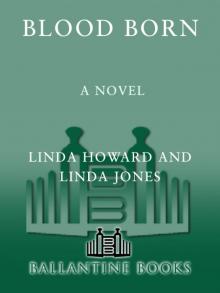 Blood Born
Blood Born The Complete Mackenzie Collection
The Complete Mackenzie Collection Mackenzie's Magic m-4
Mackenzie's Magic m-4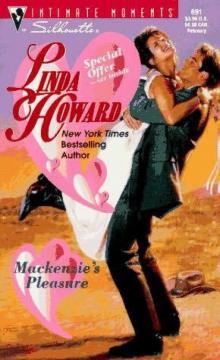 Mackenzie's Pleasure m-3
Mackenzie's Pleasure m-3 Raintree
Raintree A Game Of Chance m-5
A Game Of Chance m-5 Prey: A Novel
Prey: A Novel Lethal Attraction: Against the RulesFatal Affair
Lethal Attraction: Against the RulesFatal Affair The Raintree Box Set: Raintree: InfernoRaintree: HauntedRaintree: Sanctuary
The Raintree Box Set: Raintree: InfernoRaintree: HauntedRaintree: Sanctuary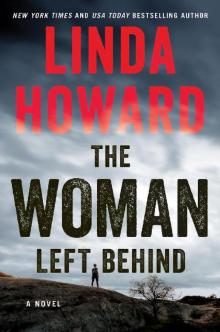 The Woman Left Behind: A Novel
The Woman Left Behind: A Novel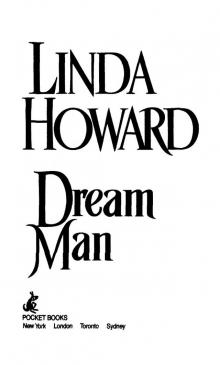 Dream Man
Dream Man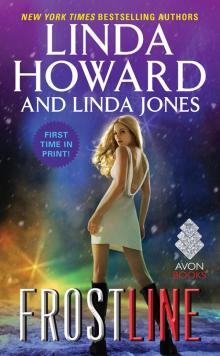 Frost Line
Frost Line Kill and Tell cs-1
Kill and Tell cs-1 Shadow Woman: A Novel
Shadow Woman: A Novel Mackenzie's Mission
Mackenzie's Mission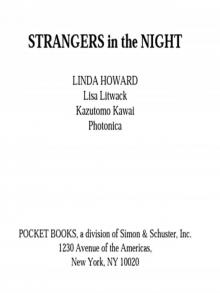 Strangers in the Night
Strangers in the Night Running Blind
Running Blind